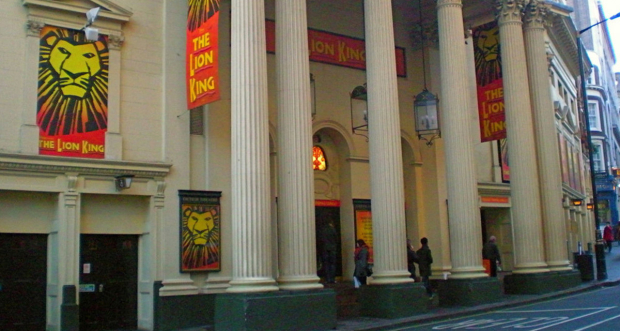Increasing accessibility to theatre – which venues are open to all?
Claire Mitchell runs through the latest in developments for disability access in UK theatres

© Curtis Cronn / Flickr
The listed status of theatres means that many are still trying to get around the problem of providing access to disabled theatregoers. Hannah, 35, who lives in London and relies on theatres providing access for her wheelchair said: "I love going to see shows, and although most try to be very accommodating, it can sometimes be awkward to manoeuvre around in them."
Most theatres are Victorian or Edwardian buildings and hence do not have permission to create the facilities required. However, more and more are accommodating for this. Newer venues, such as the Barbican, have the means to design from scratch with disabled access in mind, and therefore there are much easier opportunities available.
It's becoming more apparent that theatres across the nation are investing time into training box office and front-of-house staff to understand and promote audio-description and captioning services, in order to provide the best service for disabled clients. Companies such as Shape provide improvements and voluntary staff in order to accompany and advance the services offered.
Most theatres have from around 2 to 20 spaces allocated for wheelchair users, which means that tickets for these seats can sell out quite fast. Venues like the Royal Festival Hall and Royal Albert Hall are particularly renowned for their efforts in providing as many seats as possible for disabled viewers, and the London Coliseum and National Theatre are both well equipped.
It's easiest to call box offices to ascertain the situation and most will be willing to accommodate where they can. Sometimes these allocated seats are placed in top price areas, due to accessibility and space, therefore many theatres offer discounted tickets to remain impartial to their customers' needs and create a fair structure that those without disabilities will not need to think of when buying tickets.
Sign of the times
With regards to signed performances, Wicked, Phantom of the Opera, Les Miserables, An American in Paris, Kinky Boots, Matilda, The Play That Goes Wrong The Comedy about a Bank Robbery, School of Rock and Aladdin all offer various dates on which signed performances will be shown. Venues like Shakespeare's Globe also offer nights. Usually there are only a couple of dates, so it's important to book in advance in order to avoid disappointment.
Similarly shows like Phantom of the Opera, The Lion King, Mousetrap, Matilda, and Wicked provide regular captioned performances. Though some theatres offer hearing aid facilities, nearly all venues have 'assisted listening devices,' which can be obtained from receptions and box offices.
There are various online guides that provide information on individual theatres and their facilities. The most comprehensive can be found through SOLT at this link, and goes through each theatre and the facilities that they have. Inclusivelondon.com also provides a database of over 30,000 companies and the amenities they offer for those with disabilities.
Relaxed performances are also offered at a number of theatres, including the National, and this aims to provide performances to those in the autistic spectrum and those with sensory and communication disorders. It creates a relaxed environment in which individuals have shown to really benefit from as it reduces anxiety that a large auditorium full of people can induce. You can see our information about relaxed performances here.
With regards to carers, discount prices often come at the discretion of individual theatres. Most, if not all, theatres competitively offer reduced tickets for carers. Some give around a 50% discount, while others provide free tickets for carers. Larger companies will often require a registration for proof, and usually there are a limited number of tickets with these gratuities available, so again it is necessary to book well in advance.
The Cinema Exhibitor's Association Card offers free tickets for carers in various theatres as well. Each theatre has a different system, and different allowances, and this often also changes due to month and performance, so it is best to ring the box office to determine the best deal that is available at the time.
Options outside London
With regards to regional theatres, the South West is very well equipped with disabled facilities. The Theatre Royal Bath has wheelchair spaces available in the Stalls and Royal Circle (both of which are at reduced prices). There is also lift access to all levels as well as adapted toilets. Dogs are welcome, and they have large braille plans at the Box office.
The Theatre Royal Plymouth has assisted performances that are captioned, signed or audio described, for all their shows. Salisbury Playhouse's Access All Areas Campaign made things better at a venue that used to be trickier, and they now offer touch tours that are audio described for various performances and also sign language interpreted performances throughout the season. There is also some wheelchair access, and all those accompanied by a carer will receive a complimentary ticket.
Theatres surrounding London are also making extensive efforts to transform their space into an environment that is easier for all. Cambridge Arts Centre, which the county council say 'is accessible for everybody,' welcomes all customers. They have lifts to all floors and all areas of the bar, stalls, and circle are fully accessible. A Seinnheiser infra-red system amplifies sound from the stage and the front office staff are fully trained in using headsets, which can be found at the box office.
Interpreted, captioned and signed performances are available throughout the season and all guide dogs are welcome. The centre offer discounts wherever they can and also the opportunity to bring a carer free of charge on many of their performances. Similarly the Oxford Playhouse has many facilities available, although at the moment they are unable to install a lift because of building restrictions.
Heading North, Contact Manchester, Birmingham theatres and particularly Lyceum Theatre in Edinburgh are meeting the demanding challenges of manipulating their theatres to improve their accessibility. A good website to view a large range of regional theatres and their facilities is cix.co.uk.
Although many theatres are old and struggling with the barriers that listings place on their buildings, it is a pressing need to cater for all those that are keen to watch theatre. The increasing necessity of more facilities is certainly being implanted across the board, and there is really no reason why anyone should be turned away from theatres if there is enough notice and information given at the time of booking.















